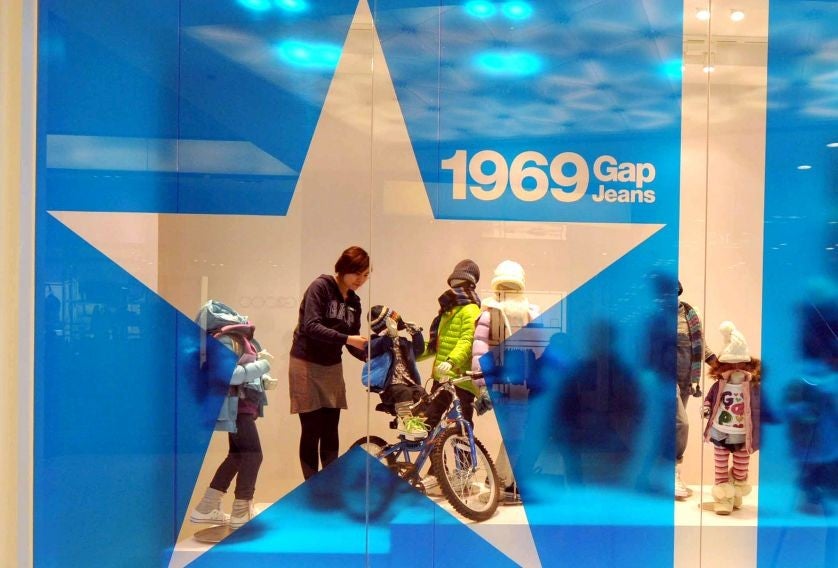Gap pays almost no tax in UK since 2011 despite sales of £1bn
The US clothing giant is the latest household name to face questions over its ‘opaque’ accounts

The fashion giant Gap is the latest US household name to face major questions over its use of complex financial engineering that minimises its tax bill in Britain.
The multinational retailer, which trades on its wholesome West Coast image, has paid almost no corporation tax – once rebates are taken into account – since 2011 despite sales of more than £1bn, according to a new analysis of its “opaque” accounts.
It follows the huge row last month after it emerged that Google has struck a “sweetheart” deal with British tax authorities to pay £130m in back taxes covering 10 years. This week, it emerged that a single Google boss, chief executive Sundar Pichai, has been awarded a shares-based pay package worth £12m more than the clawback tax deal struck with HMRC.
Gap, founded in San Francisco in 1969, is one of the most familiar presences on the high street with 132 stores and turnover of more than £300m a year. It also owns Banana Republic, which has eight UK outlets.
However, accounts reveal the three British-based Gap firms made net losses between 2012 and last year – allowing the world’s third biggest fashion retailer to reclaim more than £4.2m from the taxman and set it against future profits.
The accounts suggest Gap has been shuffling profits between the businesses and the parent company in San Francisco. This strategy, although entirely legal, has reduced its potential liability to HM Revenue & Customs.
The disclosures will add to pressure on the Chancellor to close loopholes that allow vast corporations to pay virtually no tax in Britain despite having huge sales.
Business news: In pictures
Show all 13Nick Hood, a business risk adviser at Opus Restructuring and founder of consultancy Company Watch, said: “It’s disappointing to find yet another multinational organising its financial and taxation affairs in such a complex and potentially opaque manner – especially when the result is the UK taxpayer will be substantially subsidising any future tax bill Gap might end up paying. This is all despite Gap’s UK retail sales income of well over £300m a year.”
Gap’s main British operating business is called GPS (Great Britain) Ltd. It pays an annual multimillion-pound “royalty fee” to a Dutch company with its “statutory seat” in Amsterdam – but with offices in London – called Gap (Netherlands) BV. This has had the effect of wiping out any profits in Britain, so that GPS does not have to pay corporation tax.
Last year the Gap brand royalty payment for the British – and for smaller French – operations totalled £15.1m. The UK business contributed almost £13m of this, or 4 per cent of its sales.
The Dutch company is itself liable for tax in Britain. However, profits at this Dutch operation are, in turn, eliminated by £12.55m of charges for “general and administrative purposes” and other costs such as interest payments. These expenses include a “management fee and marketing allocation” from parent company The Gap Inc, and a “merchandiser cost charge” from a third British firm – Gap (UK Holdings) Ltd.
Starbucks was found to be paying a fee to itself in the Netherlands which avoided making a profit in Britain, while buying coffee beans via a Swiss subsidiary. After a public outcry, it agreed to pay £20m in tax and has subsequently based its European operations in the UK. The European Commission is still investigating whether Starbucks was given a sweetheart deal with the Dutch taxman.
Gap said: “Gap Inc is committed to operating according to and complying with all multinational tax laws. We maintain an open and transparent dialogue with regulators in jurisdictions where we operate. We are a taxpayer in good standing in the UK, and have transfer pricing agreements with tax authorities in the UK and the US covering business activities between our entities. Our global effective tax rate has averaged approximately 39 per cent over the past decade, and we have paid almost $7bn [£4.8bn] in taxes during this time.”
HMRC said: “Multinational companies must pay the tax that is due and we do not accept less. HMRC enforces the rules impartially, irrespective of the size or structure of the business. Last year our compliance activities yielded £26bn in extra tax.”
Subscribe to Independent Premium to bookmark this article
Want to bookmark your favourite articles and stories to read or reference later? Start your Independent Premium subscription today.

Join our commenting forum
Join thought-provoking conversations, follow other Independent readers and see their replies